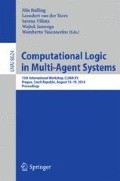Abstract
We present an alternating-time temporal epistemic logic with uniform strategies, interpreted in a novel way on transition systems for modelling situations in which agents with partial information interact to determine the way the system updates. This logic uATEL allows us to model what properties agents can enforce when they act according to strategies based on their knowledge. Apart from the usual memoryless strategies, we distinguish state-based memory, where agents recall the history of previous states, from perfect recall, where agents also recall their actions. We show that this makes a difference. Our logic includes three strategic operators for groups, representing the case where all the agents in the group cooperate actively, but do not share their knowledge, the case where some agents in the group may be passive, and the case where all the agents in the group share their knowledge. We include a detailed comparison to the literature on the subject.
Access this chapter
Tax calculation will be finalised at checkout
Purchases are for personal use only
Preview
Unable to display preview. Download preview PDF.
References
Ågotnes, T., van Ditmarsch, H.: Coalitions and announcements. In: Proc. of 7th AAMAS, pp. 673–680. IFAAMAS (2008)
Ågotnes, T., Alechina, N.: Epistemic coalition logic: completeness and complexity. In: AAMAS, pp. 1099–1106 (2012)
Alur, R., Henzinger, T.A., Kupferman, O.: Alternating-time temporal logic. J. ACM 49(5), 672–713 (2002)
Bulling, N., Jamroga, W.: Comparing variants of strategic ability: how uncertainty and memory influence general properties of games. Autonomous Agents and Multi-Agent Systems 28(3), 474–518 (2014)
Diaconu, R., Dima, C.: Model-checking alternating-time temporal logic with strategies based on common knowledge is undecidable. Applied Artificial Intelligence 26(4), 331–348 (2012)
Emerson, E.A., Clarke, E.M.: Using branching-time temporal logic to synthesize synchronization skeletons. Sci. Comput. Programm. 2, 241–266 (1982)
Emerson, E.A., Halpern, J.Y.: “sometimes” and “not never” revisited: on branching versus linear time temporal logic. J. ACM 33(1), 151–178 (1986)
Goranko, V., van Drimmelen, G.: Complete axiomatization and decidability of alternating-time temporal logic. Theor. Comp. Science 353(1-3), 93–117 (2006)
Harel, D., Kozen, D., Tiuryn, J.: Dynamic Logic. Foundations of Computing Series. MIT Press, Cambridge (2000)
van der Hoek, W., Wooldridge, M.: Cooperation, knowledge, and time: Alternating-time temporal epistemic logic and its applications. Stud. Log. 75(1), 125–157 (2003)
Jamroga, W., Ågotnes, T.: Constructive knowledge: what agents can achieve under imperfect information. Journal of Appl. Non-Classical Logics 17(4), 423–475 (2007)
Jamroga, W., van der Hoek, W.: Agents that know how to play. Fundam. Inform. 63(2-3), 185–219 (2004)
Kripke, S.: Semantical analysis of modal logic. Zeitschrift fur Mathematische Logik und Grundlagen der Mathematik (1963)
Pauly, M.: A modal logic for coalitional power in games. Journal of Logic and Computation 12(1), 149–166 (2002)
Pnueli, A.: The temporal logic of programs. In: The Eighteenth Annual IEEE Symposium on Foundations of Computer Science, pp. 46–57 (1977)
Schobbens, P.Y.: Alternating-time logic with imperfect recall. Electr. Notes Theor. Comput. Sci. 85(2), 82–93 (2004)
Author information
Authors and Affiliations
Editor information
Editors and Affiliations
Rights and permissions
Copyright information
© 2014 Springer International Publishing Switzerland
About this paper
Cite this paper
van Ditmarsch, H., Knight, S. (2014). Partial Information and Uniform Strategies. In: Bulling, N., van der Torre, L., Villata, S., Jamroga, W., Vasconcelos, W. (eds) Computational Logic in Multi-Agent Systems. CLIMA 2014. Lecture Notes in Computer Science(), vol 8624. Springer, Cham. https://doi.org/10.1007/978-3-319-09764-0_12
Download citation
DOI: https://doi.org/10.1007/978-3-319-09764-0_12
Publisher Name: Springer, Cham
Print ISBN: 978-3-319-09763-3
Online ISBN: 978-3-319-09764-0
eBook Packages: Computer ScienceComputer Science (R0)

